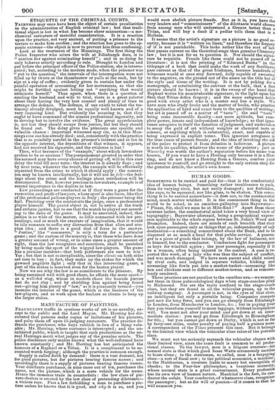HUMAN GOODS.
SOMETHING to be carried and paid for—that is the conductorial idea of human beings. something rather troublesome to pack, from its varying sizes, but not easily damaged ; not forbidden, like caps, to be squeezed, nor like glees, to be shaken. This some- thing is to be carried somewhere—it does not, to the coilductorial mind, much matter whither. It is the commonest thing in the world to be asked, in an omnibus galloping into Bayswater- " Please, Sir, shall we soon be at Mile-End ?" Apart from those extreme laches, the conductorial mind takes a very broad view of topography ; Bayswater aforesaid, being a geographical expres- sion applicable to the whole region between St. John's Wood and Brompton. Indeed, there are minds of such breadth that they look upon passengers only as things that go, independently of any destination—a something concentrated about the Bank, and to be dispersed at so much a head for that public service. A passen- ger is a piece of goods that belongs, by the law of bailment, not to himself, but to the conductor. Conductors fight for passengers as boys for windfall apples ; the poor passenger, especially if it be a woman, often being injured in the contest. A case is re- ported this week, of a lady who was thus the subject of conflict, and was much damaged. We have seen parent and child seized by rival cads, and lodged in separate vehicles, kicking and screaming like fowls put into a market-basket—screaming like hen and chickens sent to different market-towns, and as remorse- lessly sundered.
These practices are not peculiar to the omnibus mra—we remem- ber them in those palteontological days when stage-coaches plied to Richmond. Nor are the traits confined to the stage-coach class, but they are found in all the vehicular genus, up to the railway company. A passenger is not, in the eyes of that class, an intelligent but only a portable being. Companies compete just now for long fares, and you can go cheaply from Edinburgh to London, from Manchester to London, &c.; but in paying your fare you transform yourself to mere luggage, without independent will. You must not alter your mind and get down at an inter- mediate station : you may go from Edinburgh to Birmingham for 62.s. ; but you cannot get down at Derby, which is not so far by forty-one miles, under penalty of paying half a guinea more. A correspondent of the Times presents this case. But it belongs to the limited view which the vehicular class takes of the portable class.
We must not too seriously reproach the vehicular classes with their limited view, since the same fault is common to all profes- sional classes. To the lawyer, man is a litigant creature-This normal state is that which good Isaac Watts erroneously ascribes to bears alone ; to the statesman, so called, man is a taxpaying class—a sort of fiscal cow ; to the political economist, a machine; to the Malthusian, a creature liable to marry but susceptible, of checks; to the Poor-law philosopher, a vexatious necessity, whose normal state is a gruel contentment. Every profession has its own view of human nature. Mankind is the fare, its con- ductor the unfair. Your conductor, of whatsoever class, recognizes the passenger; but as for will or passion—if it comes to that he will summon you.


























 Previous page
Previous page